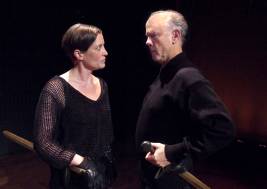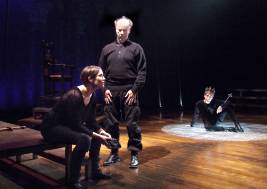
William Shakespeare. The Theatre @ Boston Court. Two names you wouldn’t normally expect to see in the same sentence let alone in the first paragraph of a review. But wonder of wonders, Boston Court is currently wowing an audience of Shakespeare buffs and T@BC regulars with its very own version of Richard II, one they’ve redubbed RII if only to let the world know that, just as Boston Court isn’t your grandparents’ theater, this isn’t your grandparents’ Richard II—not by a long shot.
 To begin with, John Sloan’s Richard isn’t backed up by twenty-eight actors as Maurice Evans’ was on Broadway in 1937. Boston Court gives him a grand total of two—Paige Lindsey White and Jim Ortlieb playing a total of twelve supporting roles between them, which is eighteen fewer than Evans’ King Richard had supporting him back in the day. Not only that, but since most of these characters are male, White ends up gender-bending four times out of five.
To begin with, John Sloan’s Richard isn’t backed up by twenty-eight actors as Maurice Evans’ was on Broadway in 1937. Boston Court gives him a grand total of two—Paige Lindsey White and Jim Ortlieb playing a total of twelve supporting roles between them, which is eighteen fewer than Evans’ King Richard had supporting him back in the day. Not only that, but since most of these characters are male, White ends up gender-bending four times out of five.
 As for following Shakespeare to the letter by setting the plot in motion in the year 1398 (with King Richard majestically atop his royal throne) and ending it two years later (with Richard having met his murderous end while imprisoned by his successor Henry IV), forget that.
As for following Shakespeare to the letter by setting the plot in motion in the year 1398 (with King Richard majestically atop his royal throne) and ending it two years later (with Richard having met his murderous end while imprisoned by his successor Henry IV), forget that.
 RII conceiver-adapter-director Jessica Kubzansky starts the show with Richard already in jail, a solitary confinement that sets his mind to wandering back over the events of the past two years, the twin halves of his psyche (“My brain I’ll prove the female to my soul, my soul the father”) aptly represented by one woman (White) and one man (Ortlieb).
RII conceiver-adapter-director Jessica Kubzansky starts the show with Richard already in jail, a solitary confinement that sets his mind to wandering back over the events of the past two years, the twin halves of his psyche (“My brain I’ll prove the female to my soul, my soul the father”) aptly represented by one woman (White) and one man (Ortlieb).
In less gifted hands than those of Kubzansky, her cast, and a team of the finest designers in town, all this might turn into an artsy-fartsy mess.
Fortunately, what we have instead is a history play turned psychological drama, experimental enough to fit neatly into the Boston Court oeuvre, yet remarkably faithful to its source, a production that will please both adventurous theatergoers and all but the most hidebound Shakespeare purists.
That’s not to say there aren’t moments when Kubzansky’s approach doesn’t quite work, namely near the end of Act One when a number of scenes feature supporting characters I found hard to distinguish with just two actors playing them all.
 Still, for the most part, Kubzansky and company keep things remarkably clear. Though Richard II is said to be the only Shakespeare play written entirely in verse, actors as “versed” in Shakespeare and as comfortable with iambic pentameter as Sloan, White, and Ortlieb make surprisingly easy to understand what from lesser actors’ mouths might come out as highfalutin gobbledygook.
Still, for the most part, Kubzansky and company keep things remarkably clear. Though Richard II is said to be the only Shakespeare play written entirely in verse, actors as “versed” in Shakespeare and as comfortable with iambic pentameter as Sloan, White, and Ortlieb make surprisingly easy to understand what from lesser actors’ mouths might come out as highfalutin gobbledygook.
I recommend that anyone as unfamiliar with RII’s plot as I was follow my example and read a synopsis before seeing the play. (There’s one in the program in case you forget.) In a nutshell, you’ve got King Richard seizing his exiled cousin Henry Bolingbrook’s estate and Bolingbrook—the future Henry IV—deciding to fight to get back his inheritance and more, the “more” being the crown on Richard’s head.
Kubzansky’s re-ordered, reduced-cast, and somewhat shortened RII benefits from not only her inspired direction but from some brilliant performances and an equally stunning design.
 Sloan’s Best Lead Actor Scenie-winning work in I Never Sang For My Father revealed his “subtle power and grace” in a contemporary role. RII proves Sloan equally at home in classical mode, and though he plays but one character, his Richard is as multi-faceted as they get. While comfortably enthroned, he’s royally effete verging on the flamboyant. (Richard’s touchy-feely interplay with courtier John Bushy suggests that “King’s favorite” might just be a euphemism for King’s lover.) Sloan’s Richard can be imperious as well, and pouty, and when locked behind bars, a figure of doomed despair. Richard II may be Sloan’s best work yet, which is high praise indeed.
Sloan’s Best Lead Actor Scenie-winning work in I Never Sang For My Father revealed his “subtle power and grace” in a contemporary role. RII proves Sloan equally at home in classical mode, and though he plays but one character, his Richard is as multi-faceted as they get. While comfortably enthroned, he’s royally effete verging on the flamboyant. (Richard’s touchy-feely interplay with courtier John Bushy suggests that “King’s favorite” might just be a euphemism for King’s lover.) Sloan’s Richard can be imperious as well, and pouty, and when locked behind bars, a figure of doomed despair. Richard II may be Sloan’s best work yet, which is high praise indeed.
White has her own Best Lead Actress Scenie for Ghost-Writer, a play in which I described her as “quite simply brilliant (and letter-perfect) in one of the year’s most challenging roles.” Playing six characters in RII, only one of them female, tops that previous challenge, and boy-oh- boy-oh- boy-oh-boy-oh-girl does White deliver. Her Henry Bolingbrook is so effortlessly masculine that seeing her later as Richard’s loving—and very feminine—Queen Isabel comes as a quite wonderful shock, Henry having been so authentically male. Later, when White disappears inside the skin of a very young Groom—a child really—the transformation had me oohing and aahing in wonder.
Ortlieb is excellent in his seven roles, including Thomas Mowbray, John Of Gaunt (Henry’s father), and the aforementioned Bushy. Still, despite Kubzansky’s having Richard name each of these characters (and White’s as well) upon each one’s entrance, Ortlieb could do more to distinguish one from the other. (A different voice for each, perhaps?)
Scenic designer Kaitlyn Pietras’ starkly simple yet effective set combines with Jeremy Pivnick’s dazzling lighting design and John Zalewski’s striking sound design to transport us in an instant from prison cell to palace to battle fields and back. Costume designer Jenny Foldenauer has each character in black pants and top throughout, to which I’d suggest a single distinguishing accessory for each character—like Queen Isabel’s scarf—the better to clarify who’s who. Richard’s bejeweled crown is a particularly gorgeous example of Foldenauer’s properties design. Last but definitely not least is Pietras’ projection design, which has words and phrases and sentences from Shakespeare’s text soaring at appropriate moments across the upstage wall, and when RII takes us to Richard’s jail cell, gives us prison bars made up entirely of fragments of words.
Elissa Weinzimmer is voice and text coach. Kat Haan is assistant director. Emilie Beck is dramaturg. Alyssa Escalante is production stage manager. Julia Flores is casting director.
William Shakespeare and The Theatre @ Boston Court may indeed be two names you wouldn’t normally put in the same sentence, or find in the closing paragraph of a review, but RII turns out to be both Shakespeare and Boston Court, so much so that I wouldn’t be surprised if Kubzansky finds her labor of love sought after by regional theaters near and far, from the most staidly traditional to the most defiantly adventurous. She may well have done Will Shakespeare’s Richard II its best favor in years.
The Theatre @ Boston Court, 70 N. Mentor Ave., Pasadena.
www.bostoncourt.org
–Steven Stanley
October 9, 2013
Photos: Ed Krieger
Tags: Jessica Kubzansky, Los Angeles Theater Review, Richard II, Theatre @ Boston Court, William Shakespeare


 Since 2007, Steven Stanley's StageSceneLA.com has spotlighted the best in Southern California theater via reviews, interviews, and its annual StageSceneLA Scenies.
Since 2007, Steven Stanley's StageSceneLA.com has spotlighted the best in Southern California theater via reviews, interviews, and its annual StageSceneLA Scenies.







 COPYRIGHT 2025 STEVEN STANLEY :: DESIGN BY
COPYRIGHT 2025 STEVEN STANLEY :: DESIGN BY